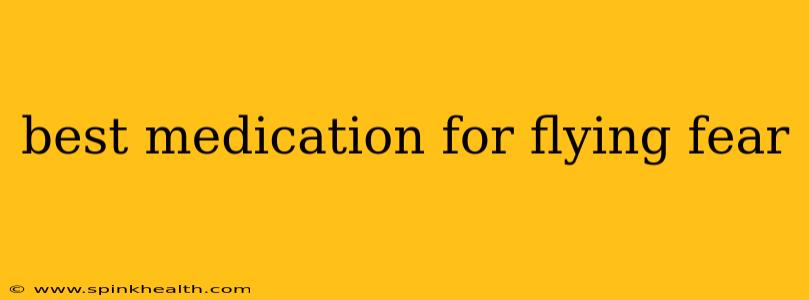Conquering Your Fear of Flying: Finding the Right Approach
For many, the thought of flying evokes a wave of anxiety, a feeling that can range from mild unease to full-blown panic. This fear, known as aviophobia, can significantly impact your life, limiting travel opportunities and causing considerable stress. But you're not alone. Millions struggle with this, and help is available. This isn't just about finding the "best medication"; it's about finding the best solution for you, which might involve a combination of approaches.
Let's explore the various avenues you can explore to manage and overcome your fear of flying, starting with the often-asked questions surrounding medication.
What medication is best for flying anxiety?
There's no single "best" medication for flying anxiety, as the ideal approach depends heavily on individual needs, the severity of the fear, and any pre-existing medical conditions. A doctor or psychiatrist is crucial in determining the most appropriate course of action. They might consider options like:
-
Anxiolytics (Anti-anxiety medications): These are often prescribed short-term to manage anxiety symptoms before and during flights. Examples include benzodiazepines (like alprazolam or lorazepam) – but these should be used with caution due to potential side effects and the risk of dependency. Your doctor will carefully weigh the benefits against the risks.
-
Beta-blockers: These don't directly target anxiety but can help manage physical symptoms like a racing heart and trembling, which are common during anxiety episodes. They're often used for performance anxiety and can help lessen the physical manifestations of fear while flying.
-
Antidepressants (specifically SSRIs or SNRIs): For those with more persistent or severe anxiety disorders, long-term management might involve antidepressants. These are not typically used for a single flight but rather to address underlying anxiety issues that contribute to the fear of flying.
It's absolutely critical to consult your doctor or a mental health professional before taking any medication for flying anxiety. They can assess your specific situation, consider any potential interactions with other medications, and help you make an informed decision about the safest and most effective treatment plan. Self-medicating can be dangerous.
Are there any natural remedies for flight anxiety?
Absolutely! While medication can be helpful, many find that natural remedies offer effective support in managing their fear:
-
Cognitive Behavioral Therapy (CBT): This is a highly effective therapy that helps you identify and challenge negative thought patterns and behaviors related to your fear. A CBT therapist can guide you through techniques to reframe your thinking and develop coping mechanisms.
-
Exposure Therapy: Gradually exposing yourself to flying-related situations (starting with imagining flying, then watching flight videos, then visiting the airport, and eventually flying short distances) can desensitize you to your fear over time. A therapist can guide you through this process safely and effectively.
-
Relaxation Techniques: Practicing relaxation techniques such as deep breathing exercises, meditation, mindfulness, or progressive muscle relaxation can significantly reduce anxiety levels before and during a flight. These are powerful tools that can be learned and used independently.
-
Herbal Remedies (with caution): Some people find relief with herbal remedies like chamomile tea or valerian root, but it's crucial to consult a doctor or herbalist before using them, especially if you are on other medications. They might interact negatively.
What are the long-term solutions for a fear of flying?
The most effective long-term solution is often a combination of therapies, with CBT and exposure therapy leading the way. These address the root causes of the anxiety, rather than just masking the symptoms. Regular practice of relaxation techniques also plays a vital role in maintaining long-term management. Remember, it's a journey, not a race. Progress takes time and patience.
How can I prepare for a flight if I have a fear of flying?
Planning and preparation can significantly ease anxiety. This includes:
- Choosing your seat wisely: A window seat might offer a sense of security for some.
- Bringing comfort items: A favorite blanket, book, or noise-canceling headphones can help.
- Distraction techniques: Engage in activities during the flight to distract yourself, like reading, watching movies, or listening to music.
- Informing the airline staff: Let the airline know about your anxiety so they can offer assistance if needed.
Remember, overcoming a fear of flying is achievable. With the right approach tailored to your individual needs – whether that includes medication, therapy, or a combination – you can regain your freedom to travel and enjoy the world. Don't hesitate to reach out to a healthcare professional for personalized guidance. They are your best resource in creating a safe and effective plan.

